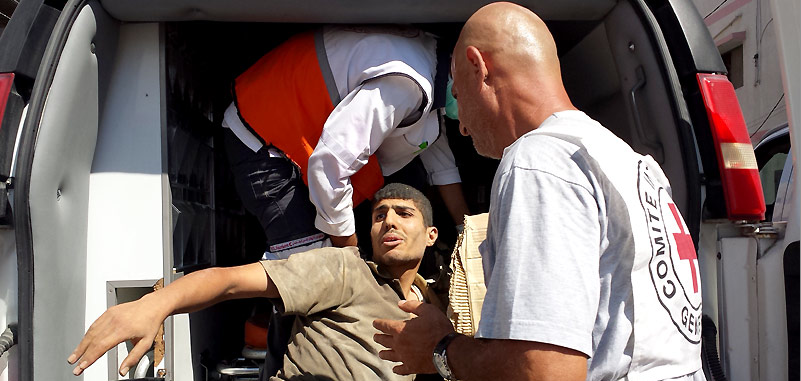In War, Civilians are Paying the Highest Price

Despite the fact that international humanitarian law is meant to protect civilians in armed conflict situations, civilian casualties in Gaza, Afghanistan and Iraq have been on the rise. As the International Committee of the Red Cross (ICRC) works to remind participants in hostilities of the need to spare and protect civilians, these are examples of the unacceptable cost civilians around the world are paying in the midst of war.
Last week, during intense hostilities in Gaza, the Al Aqsa Hospital in the city of Deir El Balah came under direct fire resulting in the deaths of at least four people and injuring scores of others.
Earlier this month a horrific bombing at a marketplace in Afghanistan killed dozens of civilians – yet another tragic incident in a country that has experienced decades of relentless violence.
Meanwhile in Syria the humanitarian situation remains critical with more aid urgently needed for thousands of civilians, including those in besieged areas.
These are just a few examples of the totally unacceptable cost that civilians around the world are paying in the midst of war.
Protecting Civilians and Civilian Facilities in Conflict
Under international humanitarian law, also known as the law of armed conflict, attacks directed against civilians are absolutely prohibited.
All those involved in armed conflict – state and non-state entities – are responsible for ensuring that only legitimate military targets are attacked, and that only those taking direct part in the fighting are targeted. Indiscriminate attacks are prohibited. When conflict erupts or is ongoing, civilians must be kept safe from harm. Civilian facilities such as schools, religious sites and water and electrical infrastructure must not be targeted.
IHL also states that health facilities, personnel and transport being used for medical purposes must be spared and that wounded and sick people must – to the fullest extent practicable and with the least possible delay – have access to medical care.
Despite this, health care systems around the world remain under threat. Indiscriminate attacks continue to claim civilian lives.
In a recent report, the United Nations confirmed that in Afghanistan there has been a 24% rise in conflict-related civilian casualties compared with the same period last year. Our delegation in Kabul has observed a grim upsurge in the number of civilians being killed or injured in incidents such as the marketplace bombing last week, or caught in the cross-fire between Afghan security forces and opposition groups.
The Situation in Gaza
In Gaza too, civilians are paying a heavy price of escalating conflict. The intensity of the recent violence has impacted the entire population of this densely inhabited Strip, with more than 100,000 displaced and casualties mounting. Many civilians also remain in the areas affected by hostilities, experiencing fear and panic. ICRC’s movements in order to provide assistance and protection are getting more and more difficult, while needs are increasing.
Last week’s shelling of Al Aqsa Hospital resulted in severe damage. The surgical ward, the intensive care unit and pieces of life-saving equipment were all affected, disrupting essential medical services. This is yet another illustration of the dangers faced by health care personnel, patients, ambulances and hospitals in many conflict situations around the world.
Water, sanitation and electrical infrastructures have also been directly or indirectly damaged in the fighting, with up to half the population of Gaza reportedly without direct access to running water. However with lack of security restricting movements within the Strip, repairs are difficult to carry out.
In every context in which the ICRC works we remind all parties of the need to protect and spare civilians and to facilitate the access and work of medical personnel and facilities. In Afghanistan, Gaza and dozens more conflicts around the world, protecting and assisting the civilian population is the top priority.
Andrea Lunt, ICRC Australia Communications Officer


